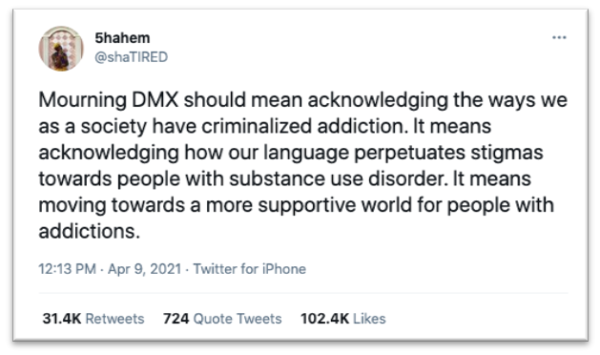by Aaron Conley
Drawing on personal experiences, Will Welch, the global editorial director of GQ, discussed COVID-19’s impact on addiction, sobriety and art with Danny Winder, director of the Vanderbilt Center for Addiction Research, and Erin Calipari, assistant professor of pharmacology, during an April 21 event.
The virtual gathering, hosted by the Vanderbilt University School of Medicine Basic Sciences, was attended by Vanderbilt alumni and community members across the U.S. In introducing Welch, Dean Larry Marnett noted that, while the pandemic has adversely affected the public health crisis of addiction, methods of addressing COVID-19 provide parallel hope in the addiction space.
“From the pandemic, we’ve learned just how critical public health messaging and implementation are—specifically through ‘wear a mask’ messaging. The ‘mask’ of addiction is destigmatization,” Marnett said. “If we can normalize the idea … that addiction is not a moral failing but rather a disease of the brain, increased treatment-seeking and availability could have a meaningful effect.”
Winder and Calipari then led a discussion with Welch on addiction, sobriety and art through diverse topics from GQ magazine to masculinity, DMX to Brad Pitt, and Hemingway to jazz.
“Telling stories around and about addiction, substance abuse, sobriety, legalization, decriminalization—all of these things have been an important part of the topics we have taken on at GQ under my leadership,” Welch said.
The impact of celebrity narratives on addiction
In discussing his first issue as editor of GQ, Welch shared that “it was important to me, as someone who identifies as clean, to publish a piece by one of our most accomplished writers looking at the myth correlating substance use and abuse and creativity. The message that came through was that you do not have to be self-destructive to be creative, or iconic, or a great artist. This is an issue throughout the arts, not just music. But in rock ’n’ roll, hip hop, it’s so intertwined with drugs.”
Winder, Calipari and Welch discussed the impact of celebrity on the conversation about addiction through the example of the untimely passing of rapper DMX, who struggled with addiction. Welch was specifically touched by a tweet that was shared with him:
“It gives me goosebumps to read that,” said Welch. “A sentiment that was coughed up by the internet, shared over 28,000 times because DMX on some level succumbed to a lifelong substance abuse struggle. And I thought, ‘Wow. That is pretty substantial discourse to be encountering ambiently on Twitter … because a celebrity passed away.’”
“It also goes to show that people are ready to have this conversation,” Calipari followed, “and thinking about what addiction is and who it affects and how to help them, rather than sweeping it under the rug as has been done in the past. As it impacts celebrities and people we love and know, people feel: How do we fix this?”
The changing face of masculinity
“A much broader mission of mine as the editor of GQ is to really break down old ideas of masculinity,” Welch said. “So, we are really interested in gender norms. There is a history of glossy fashion magazines like GQ being associated with creating or upholding problematic society norms: beauty standards, men need to be masculine, women need to be a certain type of womanly. Rather than creating or upholding those norms, it is really the project of me and my team to deconstruct those norms. And so, having conversations with men who happen to be famous, because that is our raw material, about things that men should do effortlessly and coolly like use drugs and then leave them aside, and be creative, and be a great family man, but that is just not possible. So, deconstructing those norms is what we are about on a broader level.”
The myth of moral failing
“We need to stamp out this myth of a moral failure,” Winder said of the stigmatization surrounding addiction. An example “from the recent Derek Chauvin trial: Using the ‘drugs in the system’ approach to imply that someone is responsible for their own death is something we have to get rid of. We want to increase the understanding that this is an organ-based disorder—that drugs and alcohol … produce molecular changes in our brain that develop this problem of substance use disorders. This needs to be messaged from science in specific ways.”
Basic science provides hope
“The phenomenally rapid development and implementation of COVID vaccines provides hope in this time,” Marnett said. “In parallel, the incredible advancement of neuroscience research technologies provides hope that basic science can make fundamental discoveries in the brain that will provide new strategies for treating addiction to change the arc of this disease.”
Upcoming events and resources
VCAR released an interview with musician Langhorne Slim about his personal experiences with addiction. Additionally, VCAR will be hosting an event with Jason Isbell in October.
“If you, or someone you know is struggling with alcohol or substance abuse,” Winder said, “we encourage you to reach out to resources for help. One excellent starting place on campus is Vanderbilt Recovery Support, whose website also provides lines to a variety of web resources to facilitate treatment-seeking individuals.”
View the entire lecture on YouTube.
